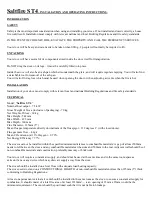
2.- INSTALLATION.
The form of installing the stove will decisively influence its safety and correct working
order.
It is very important for it to be well installed.
The correct installation of the stove and the chimney may be difficult and we
recommend it be done by a professional. Should you decide to do it yourself and you have
any doubts, please ask a professional for help or call us directly at the factory.
A.- LOCATING THE STOVE FOR GREATEST PERFORMANCE
The stove gives its heat both by infrared radiation, heating walls, ceilings, furniture,
etc. directly, and by heating the air, producing a convection movement that takes the heat to
the most distant parts of the room.
The BENNINGTON mod. Stove produces a gentle, uniform and radiant heat that
leads to pleasant comfort in your home.
The best location for the stove is usually in the lounge, it being a large room and
generally located in the centre of the home.
If the house has two floors, the best location is on the lower floor and near to the
stairwell.
B.- CHIMNEYS
The working order of the stove depends on:
a) The chimney
b) The form of operating with it
c) The quality of the fuel used.
After years of use, you may change the type of fuel, although once the chimney is
installed in a particular spot, it is not easy to modify it or change its place. Therefore, the
following information will help you decide whether you can make us of the existing chimney
or not, or whether to decide to build a new one. This information will help you to make the
correct decision.
1.- How chimneys work
Basic knowledge of how chimneys work will help you to make the most of your stove.
The function of the chimney is:
a) To evacuate the smoke and gases without danger to the outside of the
house.
c) To provide enough draught in the stove for the fire to remain lit.
What is draught?
The tendency of the hot air to rise creates draught. When the stove is lit, the hot air
rises up the chimney and goes outside. The chimney flue heats up and keeps the draught.
Until the stove and the chimney are hot, the draught will not work properly.
The location, size and height of the chimney affect its draught.
The following must be taken into account:
- Chimneys located inside the home keep warm and, therefore, the draught is
greater.
- The recommended size of the chimney maintains a good draught.
- The height of the chimney affects the draught. Greater height: better draught. The
chimney must stand out by at least one metre above the highest part of the roof.




































